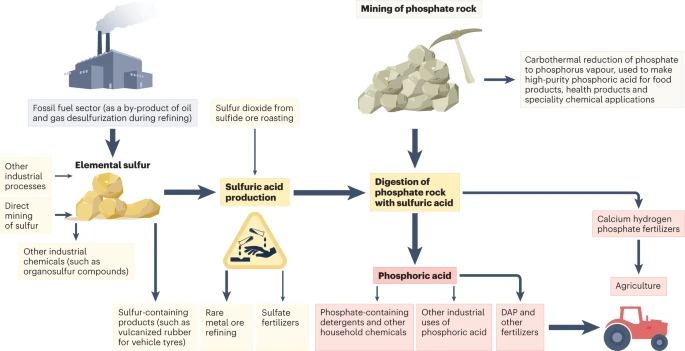
The dramatic increases in agricultural yields over the 20th century have been supported by the broad spread application of fertiliser containing, amongst other elements, phosphorus. Whilst phosphate can be obtained from mining, the vast majority is obtained from cheap sulphur, which is a byproduct of refining fossil fuels. As the energy sector decarbonises, there will therefore be a large decrease in the availability of sulphur, leading to a rapid increase in price.
This price increase will be exacerbated by the rising demands for sulphuric acid (a product of sulphur) that is critical to the production of batteries and other technologies on which the transformation to post-fossil fuel economies depends.

Fig. 1: Day et. al., 2023. Diagram showing the links between sulphur by-products from the fossil fuel sector, through sulphuric acid use in processing phosphate rock, and finally to the use in agriculture
Phosphorus remains essential in plant growth and, without an alternative to fossil fuel derived sulphur, increases in the price of fertiliser will contribute to global food insecurity through increased food prices. This insecurity will be distributed unevenly across the globe, as higher income countries tend to have higher reserves of residual phosphorus in cropland soil, whilst cropland in Africa and South America are deficient.
A range of options are available to anticipate this future shortage of phosphorus fertiliser, including:
- Utilising phosphate rock powder, though this carries severe eutrophication risks
- Increases in mining for sulphur
- The promotion of circular food systems that recycle phosphorus from sewage
- Farming practices to increase phosphorus efficiency and increase plants’ access to phosphorus
- A variety of bio-fertilizers including inoculants containing fungi, rhizobacteria or P-solubilizing microorganisms
Abstract
The overlooked link between fossil fuel-derived sulphur and the production of phosphate fertilizers may lower agricultural productivity and harm global food security unless action is taken.
Reference
Day, S., Alexander, P. and Maslin, M., 2023. Energy decarbonization threatens food security by reducing the availability of cheap sulphur. Nature Food, pp.1-3.
Read the full commentary here. For a discussion about fertiliser use, see the TABLE blog Beyond the label: assessing the spectrum of practices in French organic vegetable farming.







Post a new comment »